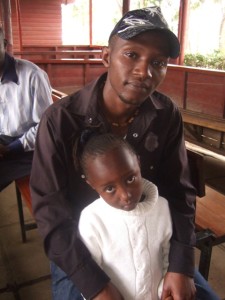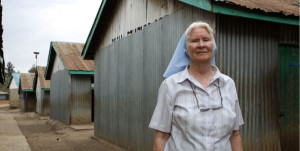
By Sarah Mac Donald - 27 November, 2015
Pope Francis will meet Irish missionary nun Sr Mary Killeen in the Nairobi slum of Kangeme today as part of his final day in Kenya before he travels on to Uganda.
The Mercy Sister is due to make a five minute presentation to the pontiff ahead of the announcement of financial assistance for a project selected as a memorial of the Pope’s visit.
Over half a million people live in the cardboard-and-tin slum in Nairobi, one of the city’s poorest and most densely populated, and lacking adequate sanitation and water services.
Most of these people have left their rural homes because of poverty and came to the city in the hope of finding work.
Some are successful but the majority, being unskilled and uneducated, remain jobless.
They live in very poor shacks made from cardboard or plastic material while those who are a little better off have houses made from corrugated iron sheets or similiar substances.
These one-roomed houses are approximately ten by ten feet and have no sanitation or running water. There is no waste collection and most of the waste, household and other, goes directly into the nearby river.
About 60% of Nairobi’s population live in slum conditions. Slum dwellers pay rent for their shacks to landlords who ‘own’ the land. The amount varies from US $12-25 per month depending on the location of the house.
There is no space for children to play. There are no recreation facilities for adults or children with the exception of bars, video shops, pool tables.
Many turn to local brew, drugs and crime. Against this background, Mukuru Promotion Centre (MPC) which was founded by Sr Mary is making an impact implementing a holistic programme of education, health and social development components in collaboration with the Mukuru community.
In 1985, there were no schools in Mukuru and no government funds available to establish any.
 A group of representatives on behalf of the people of Mukuru met Sr Mary Killeen and asked her to help them do something for their children’s educational needs.
A group of representatives on behalf of the people of Mukuru met Sr Mary Killeen and asked her to help them do something for their children’s educational needs.
The Dubliner told them, “Build me a hut and I will teach your children.” She then advised them to request that the City Council in Nairobi provide the site, which it did.
So they built a corrugated hut and, in it, Sr Mary, with Fr Manuel Gordejuila, offered education to the slum children and the beginnings of community development there began.
The initiative was called Mukuru Promotion Centre and it grew over the next 10 years to accommodate 7,000 children in several separate schools, together with multiple other projects, covering health care, skills training and community development.
Sr Mary hails from Phibsboro in Dublin, and has spent the past 30 years teaching and managing schools in Kenya, having arrived there first in January 1976.
In 1997, Trnava University, Slovakia, conferred an honorary doctorate on Sr Mary for her work in Mukuru which now covers the following:
The Primary Schools:
– Mukuru Kaiyaba;
– Ruben Centre, Mukuru Kwa Ruben, now run by the Irish Christian Brothers (Australian Province);
– St Elizabeth’s, Lunga Lunga;
– Our Lady of Nazareth, Kwa Njenga, now run by the Marianist Brothers;
– St Catherine’s;
– Bakhita Primary School.
Other projects:
– Skills Training: masony, carpentry, plumbing, art, craft, dressmaking, knitting, hairdressing, beauty, cookery, catering, hygiene, vegetable growing, rabbit rearing;
– School for disadvantaged children;
– Business training;
– Secondary education;
– Health clinics;
– Social work department;
– Street children rehabilitation;
– Half-way house shelter;
– Support group for HIV/AIDS;
Initially, the Mary Immaculate Clinic was set up to cater for the families of the children who attend the primary schools. Now the Clinic is open to all residents of the Mukuru villages. Approximately 100 people from the slum area attend the Clinic daily.
 There is a minimum charge of US $0.50 for each visit. Services include general preventive and curative medicine, maternal and child health, (including prevention of mother to child transmission of HIV) and an anti-malnutrition unit, which is staffed by professionals from St Elizabeth School of Community Health and Social Work in Slovakia.
There is a minimum charge of US $0.50 for each visit. Services include general preventive and curative medicine, maternal and child health, (including prevention of mother to child transmission of HIV) and an anti-malnutrition unit, which is staffed by professionals from St Elizabeth School of Community Health and Social Work in Slovakia.
The Clinic is staffed with a Nurse Manager; Clinical Officer; Nurses; Pharmacists; Laboratory Technicians and Support Staff. Mission for Essential Drugs Supply (MEDS), which is a church-based organization, supplies the drugs and they ensure quality low cost drugs to its customers.
With the escalation of HIV AIDS among the population, a Voluntary Counseling and Testing Centre was established in January 2004. This Centre offers free HIV/AIDS counseling and testing to the people in the surrounding slums.
HIV positive persons are referred to the Comprehensive Care Clinic (CCC) at the Mater Hospital which is a neighbouring hospital also under the care of the Sisters of Mercy. At the CCC all patients receive free treatment, support and care for themselves and their families.
The Community Based Health Service provides daily primary health care to residents in their own slum villages. Two Nurses attend clinics in the 11 villages on a rotating basis. Community Health Workers are a wonderful asset to the Community Based Health programme.
From 2008 to 2011, MPC trained 1000 Community Health Workers some of whom now contribute their voluntary services to assist the nurses who move around the villages to bring services close to the people. The Community Health Workers mobilise the villagers to attend the clinics, and alert the nurses to people who are bed-ridden so that they, too, can benefit from care.
 In four years MPC has installed 15 water tanks in the villages. Village Health Committees and the community members provided labour for construction.
In four years MPC has installed 15 water tanks in the villages. Village Health Committees and the community members provided labour for construction.
Community managed water points have resulted in cheaper water rates for villages. Clean-up exercises are a regular activity of the community groups.
St Bakhita Skills Training Centre
Many students find it extremely difficult to gain employment, even with a secondary education. Youth unemployment in Kenya is very high. So it is very important to assist young people to acquire a skill that will enable them to provide for themselves and their families.
The skills training centre is specially designed to impart practical skills to students with a view to future employment. The course includes: dressmaking, hairdressing, knitting, crafts (including beading, weaving and tie and dye cloth) catering, computer studies and self awareness skills.
The hairdressing and computer labs, which were established in 2006 with the help of Colomer group and the British Airways respectively, have been of great assistance, since they are equipped with modern facilities that would not have been accessible otherwise.
The Mary Immaculate Rehabilitation Centre was established in 1995 for the many street children who were wandering and living on the streets of the adjacent Industrial Area. Now, with the opening of the new dormitory, we cater for up to 65 boys who participate in a one year long program. We conduct non-formal primary teaching for those for whom it is appropriate, and carpentry and art for the older boys.
After lunch they engage in extra curricular activities; art, music, football, gardening, scouting and some craft work. Tackling the habit of substance abuse is a challenge for most of the boys in the program. Group and individual counselling is an integral part of the programme and is carried out on a very regular basis.
The goal of the program is to re-integrate the boys to family (if possible) or to a meaningful life off the streets, in boarding school or in employment.
During their 12 months in the Rehabilitation Centre, the social workers contact the relatives of the children and prepare them for their children’s return. Some extend a warm welcome to the children while others are not so receptive.
These are the ones that continue to offer challenges to the staff because the integration to a regular life-style becomes more difficult without family support.